Mark Suster, Partner at Upfront Ventures, chats with John Somorjai, EVP Corporate Development at Salesforce, about the dos and don’ts of M&As. After 20 years in the business and more than 200 investments in SaaS companies, John can certainly teach us a thing or two. Furthermore, these two gentlemen have worked together in the past, which allows them to provide some unique insights into how the M&A between their companies worked out.
One of the first things to keep in mind when you get into an M&A partnership with someone is that you shouldn’t make it all about money. That will cause a slew of problems in the long run and you’re only going to hurt yourself in the end. Focus on finding the right partner that will have the company’s best interest in mind.
When you’re looking to get acquired, you’re like going to be talking to multiple buyers at once. You may even want to be direct and simply ask a company to acquire you. John talks about how to do this in a delicate manner.
And if you haven’t heard: SaaStr Annual will be back in 2018, bigger and better than ever! Join 10,000 fellow founders, investors and execs for 3 days of unparalleled networking and epic learnings from SaaS legends like Jyoti Bansal, Aaron Levie, Josh James, and Dustin Moskovitz. If you don’t have tickets, lock in Early Bird pricing today and bring your team from just $649! (Prices go up August 1st.) Get tickets here.
TRANSCRIPT
Announcer: He sold his second company to Salesforce. He then built the biggest and most prominent venture capital firm in Los Angeles. Chris Bosh and Robert Downey Jr. were at his own Upfront Summit last week. Please welcome to the stage, a man who needs no introduction, Mark Suster, partner at Upfront Ventures.
Mark Suster: Hello. Hope everyone doing well. You guys all still awake? Good. I want to quickly introduce a good friend of mine, someone that I’ve known and worked with for years. He’s the Executive Vice President of Corporate Development and runs Salesforce Ventures for Salesforce.com. John Somorjai, why don’t you come on out?
John Somorjai: How are you?
Mark: Good. How are you?
John: Good.
Mark: I feel like I should be Jimmy Fallon. We should have a game that we’re supposed to play and make fools of ourselves out here, but…
John: It’s a great stage.
Mark: …no such luck. I want to talk about Salesforce Ventures first. Corporate venture capital. Fred Wilson, a year ago, publicly said, “You shouldn’t work with corporate venture capitalists.” You run a corporate venture capital group.
First of all, what do you think of that as a broad statement? Not about Fred, but as a broad statement. Should we work with corporate venture capitalists? How do you think Salesforce Ventures is positioned in the market?
John: I think that was a broad brush that he applied to an entire industry, which isn’t often an accurate way to portray it. There are different types of corporate venture firms. I’m sure you’ve experienced this yourself.
How we like to think of ourselves is we are strategic investors that are focused on helping our entrepreneurs build out great cloud enterprise companies.
The whole goal of our program was building an ecosystem of partners that would help provide more solutions for our customers and raise the whole level of the cloud industry around the world.
We approach it in a way that is very entrepreneurial friendly. We help our companies. We advise them. We introduce them to our executives, to customers. The whole goal is to help them grow rather than to try to make money and maximize all of the rights.
Mark: If I could put on one end of this spectrum, I think Google Ventures has very publicly said that we’re just financial. That’s what we’re in it for.
Over on, this side of the spectrum are maybe the corporate venture capitalists that Fred Wilson is worried about, because I’ve been involved with many deals in which corporates are asking for over sale, over engineering our product.
They’re asking for right of first refusal, which makes an acquisition difficult. They’re asking for two board seats and a commercial agreement that has to be signed by us. You guys don’t do any of that, right?
John: We don’t do any of that. We ask for a notification right. If you’re about to be acquired, just come and tell us first and give us an opportunity to participate in the process. There’s no blocking right or anything like that. We just want a notice.
That’s usually helpful to the companies, because it helps them create a little bit of a process. We ask for quarterly financials, because we invest off of our balance sheet. We don’t have a separate fund. We’ve got to track the performance of every company every quarter and know whether we need to mark up a valuation or impair it.
Mark: Does that ever get disclosed? I know when Fidelity and some of the later stage mezzanine finance people were starting to take positions in late stage companies. It became very public, how their valuation metrics were. Do you guys disclose that?
John: No, not on an individual company basis. We just have to disclose the aggregate value of the portfolio, and then how that’s changed quarter by quarter.
Mark: If you don’t mind, let me just offer you some advice real quickly. First of all, I’ve worked with John on several deals together. We don’t mind notification rights, but I won’t sign a corporate deal with someone who asks for a ROFR.
A ROFR stands for Right of First Refusal. The problem with a ROFR is, let’s say that John would ask for a ROFR, which he doesn’t, then anyone else who wants to engage in that process, whether it be SAP, or Microsoft, or Oracle, or Adobe, or anybody else, they’re not going to want to get involved in an M&A process because they know that they’re a stalking horse for the insider to buy.
Notification right doesn’t bother me as a venture capitalist, for the reason John outlines, which is the fact that I have to notify Salesforce.com helps me create a marketplace if someone else shows interest. Actually, a marketplace is how you get a fair price. I’ve got nothing but good experiences.
Talk about how many deals you’ve done, what is the average check size of deal that you do? You say you’re strategic, what strategy are you trying to drive with this program?
John: Let me start with the last question. Again, we are trying to deliver more integrated solutions for our customers.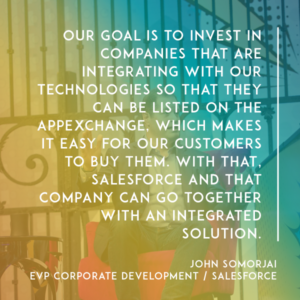
Our goal is to invest in companies that are integrating with our technologies in some ways so that they can be listed on the AppExchange to make it easy for our customers to buy them, buy that technology, and we can go together with an integrated solution.
We also invest in companies that are building on our platforms. We have a great platform consisting of Force.com, Heroku, for building internal employee facing apps, for building external customer facing apps.
We have a Lightning Fund for building lightning components. All of that together is the Salesforce platform. We want to grow that business quite a bit. One great example of the value that our platform can bring with Veeva, which is one of the most profitable SaaS companies that’s gone public.
They are profitable because they’re built on our platform. We also invest in System Integrated Partners. That’s how we think of it on the strategic side. One of the other things that’s very unique about Salesforce…
Mark: Do you mind if I just ask you a follow up on that there, John? Do you guys have internal resources, sort of the glue? Once you’ve done an investment, to then help me get access to the sales team and the sales engineers and marketing, do I get to be on stage at Dreamforce?
Do I get extra benefit or is it just money?
John: You definitely get extra benefits. We provide, first of all, a lot of advice to our portfolio companies because we’ve done so many investments. I’ll get you the numbers in a moment. We have a very good sense of both on the investment side, and if you’re setting yourselves up for M&A down the road, what are the best practices around that.
We also provide the access to our customers. We introduce our portfolio companies to relevant executives within Salesforce on the product side and on the sales side. There is a lot of benefit that you can get from that. In terms of numbers, we have right now, a little over a 175 active companies in the portfolio. We’ve had over 40 exits and 7 IPOs.
Some of the most notable IPOs – Twilio, Box, Hubspot. The programs have a lot of success. When you look at some of the exits too, it is interesting to note that Oracle’s bought some of our companies. Amazon has. Adobe has. Yahoo has.
Mark: So just because someone takes money from you, they don’t have to worry about maybe getting an exit somewhere else? I mean, do you guys ever try to block a sale, or does it ever become contentious, or…?
John: We would never try to block a sale. Again, going back to what I said earlier, we’re an entrepreneurial friendly company. This is about growing our partners, and so we’re pretty helpful actually when an exit process happens. I would say in terms of the exits, themselves, we always will work with the entrepreneur to try to maximize what the company is receiving on that.
Mark: Average check size, and do you lead or follow? How does that work?
John: Our model is to co-invest with VCs. My team is relatively small for considering all the transactions that we do. We don’t have the capacity to lead a lot of rounds. On occasion, we have led rounds but it’s less than 10.
That’s because it was more about getting the right allocation, but our preference is to always co-invest with a Venture Capital Firm and we’ll do it at any stage. We’ll go from series A, up to the later stage rounds. The check sizes will range from 250 to 500K in an early round, all the way up to maybe 10 million in a later round.
Mark: If I want Salesforce.com to be an investor in my company, is the best route to go find a VC that’s friendly with Salesforce.com, or can I approach you and say, “We’d like you to invest,” and you’ll introduce me to VCs, or do I play…? How does the process work?
John: You can approach us directly, and we will introduce you to VCs, or go to one of… there are many friendly VCs here.
Mark: I heard there’s some in LA too.
John: Yeah. I meant here at this conference.
Mark: [laughs] Sorry.
John: Of course. We make the process pretty easy. The other thing, that’s worth mentioning too is our 1-1-1 Model, which is another area where we’re very different. As many of you know, one of the tenets of our company is Corporate Philanthropy and giving back to our communities. We follow the 1-1-1 Model, where we gave one percent of our equity to a foundation when the company started.
That’s now grown into a very substantial amount that enables that foundation to give out grants, and to do employee matching for employee giving. Employees also give one percent of their time for volunteer hours.
We offer, I think, up to an entire week. Actually, up to seven days now that employees can take during their work year and give that to causes that are important to them.
Lastly, we allow non-profits to use our products for free. We have over 30,000 non profits use Salesforce for free. We are encouraging actively all of our portfolio companies to adopt it. We have 70 companies that have adopted all three of the 1s. We have a smaller number that’s adopted, maybe two of the 1s.
Mark: If I could say, if any of you are ever in the position to be super generous like Marc Benioff and Salesforce overall has been because you have a windfall…If you give cash, if you want to give $1 million away, you have $1 million in cash, you get taxed on that cash.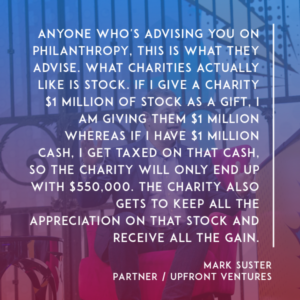
Let’s say, you get to keep $550,000 of it. You give that money away to a charity, you’re giving them $550,000 of cash, and now they got to figure out what to do with it.
What charities actually like is stock. There’s a couple reasons. If I never sell the stock, but I give them $1 million of stock as a gift, I now am giving them $1 million.
Number two is, they get to keep all the appreciation on that, so if you give them stock in an early stage company that will appreciate, they get all the gain as well. Anyone who’s helping advise you on philanthropy, that’s what they advise. The 1-1-1 program, I guess, makes it easier to do that.
John: It does. We actually have people within our foundation who will advise you on how to set it up. The whole giving back piece is also super important to employees. We find that it’s one of the key reasons why they love working at our company. When you think about employee retention, and what millennials in particular are looking for in their companies, a program where you’re giving back is important.
Mark: Us Gen Xers, we’re more of tight fisted bastards but the next generation of people…No, I want to spend some time on M&A because I think that’s something everyone in the room wants to know. Rather than focusing on what Salesforce itself buys, or wants to buy, let’s get into the advice business.
When you want to sell a company, first of all, how early should you approach a potential buyer? The fear factor that everyone always has is, if I start talking about a sale, is that seen as a sign of weakness? Should I not talk about a sale? Do I have to do a bizdev relationship in order to get a…?
What’s the best way for people, not just for Salesforce, but anyone to develop a relationship to one day be acquired?
John: I would say that building out a partnership with a potential acquirer or two, or three of them, is usually the best way to start, where they get a chance to work with you, you work with them. They know your technology. Their customers are using your technology. Those are the sorts of proof points, as a corporate development executive, that’s what I’m always looking for when we’re thinking about buying a company.
Are our customers are using this technology and how do they like it? Are there champions within our company that are going to raise their hand and say, “I think this deal make sense. We have to buy that company.” You want to start building those relationships. The best way to do that is through partnering, and I would start early.
Once you have a product in market and you’ve got some early traction with customers, it’s not something that you want to hold back on and be secretive, and be stealth about it. You want to build those corporate relationships. It will only help you in the end.
Mark: I have a relationship going. We’re co selling product, maybe we have some product integration, and corporate buyer gets to see how I behave, how I act. How do I flip that into a dialogue? It’s very tricky business, right?
Let’s say my valuation is $80 million. I’m thinking, “OK, maybe now I could raise $20 million.” Raise a big round, like $40 million, whatever.
If I do that, now my chance of being acquired is that much higher? Maybe this would financially be good for me. I don’t want to go right out and say, “Will you acquire me?” What’s the delicate act? What’s the balancing act?
John: First of all, it is important that when you’re at those moments, you do the math. You actually go through a spreadsheet exercise where you think about, “If I raise another round, how much more dilution am I taking? How much more loss of control am I having on the eventual exit that I may want to pursue?”
If you set a valuation, how long is it reasonably going to take you to achieve the metrics that would justify an exit at a higher valuation?
You have to go through that exercise. Unfortunately, I think few entrepreneurs actually do and they get very enamored by all these term sheets flying at them. They’ll try to maximize their valuation.
That is absolutely the wrong thing to do, in my view. It’s never a good decision to maximize your valuation, and you want to think carefully about the terms you’re agreeing to and who you’re partnering with as a VC.
There are some very entrepreneurial friendly VCs and there are others that you will come to regret working with, especially when you’re approaching a sale situation. When you’re at that sale situation, you want people that are going to be helpful to you, not people that are going to fight you along the way. There are lot of variables that you have to think about when you’re looking at that.
In terms about the delicacy of approaching a corporate buyer, this is where the champion that you have internally is your best advocate. Rather than hiring a banker or going directly to corporate development, it’s usually better to have a conversation with the person within the company that you think would be the best person to champion and acquisition for you.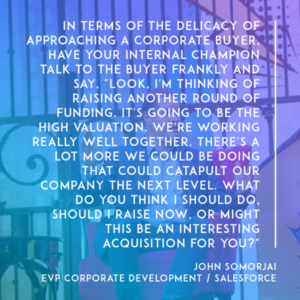
Just talk to them frankly and just say, “Look, I’m thinking of raising another round of funding. It’s going to be the high valuation. We’re working really well together. There’s a lot more we could be doing that could catapult our company the next level. What do you think I should do, should I raise now, or might this be an interesting acquisition for you?” And just have that conversation.
Mark: What about the very delicate balancing act and recognizing you have a bit of a bias in this answer, but let’s try to stick to the advice column here. I’ll make it a different company.
Let’s say I have a relationship with Adobe, and that’s going very well. Like anything in life, if I have a market, I feel like I’m more likely to get a fair exit price.
If I discuss with Adobe, and they say, “Yes. We’re going to go through a process. Please, don’t talk to anyone else.” I’ll give you an example, IBM said this to one of my companies. IBM said, “We will give you a fair process and a fair price. If you talk to anyone else, we’re out.” I didn’t really believe them but people…
John: That’s why we have our notice right. That’s exactly why we have notice…
[crosstalk]
Mark: The people play like a strong arm. How do you feel about that? Should I, as an entrepreneur, talk to two or three people? Should I talk to seven people? Am I running the risk of offending you guys if I talk to your competition.
John: I think you want to talk to the place that’s going to be the best home for you and your employees and focus on that, and the process will go as it may.
You may have a board member that will force you to talk to someone else, but at the end of the day, be the person that’s controlling the process and where you want your company to end up and find the best home for your company. That’s always the right thing to do rather than maximizing price and placing your employees in a location where they may not be happy.
Mark: You would say, “Look, in a perfect world if you’re working with Salesforce, don’t talk to Oracle and SAP and Microsoft. But if you’re doing it graciously, it’s not disqualifying for us.” Is that a fair way of putting it?
Like if someone’s rubbing your nose in it, it’s going to put a bad taste in your mouth, and then you start thinking, “Shit, I got to work with this person. Maybe I’m not going to enjoy that.” Some amount of acquisition is liking and respecting the people, isn’t it?
John: Absolutely, because you’re going to have to work with them. You have to handle the process very carefully.
Again, if you feel like you need to hire a bank to help you, hire one that will be helpful in the process and won’t piss off the company that you want to buy your company.
It’s a very delicate process that you go through. In the end, if you just stay true to, “This is the best outcome that I could achieve, this is the right place for me and my employees, and we’re going to a home that will really accelerate our business,” then get the deal done.
Mark: If you were advising your brother and you wanted him to maximize his own personal earnings…Do you have a brother?
John: A sister.
Mark: If you were advising your sister, would you tell her hire a banker? Would you tell her to hire Frank Quattrone?
Even though it’s going to drive corporate development nuts, that’s the best way to get the best price? Would you say, “Be careful. You might get a higher price, but you might piss off buyers”? What would your real advice be to your sister?
John: I think having done this for so long, I’ve been in M&A for 20 years, I’ve just seen so many situations where someone is just focused on maximizing price and leaves a wake of carnage around the deal.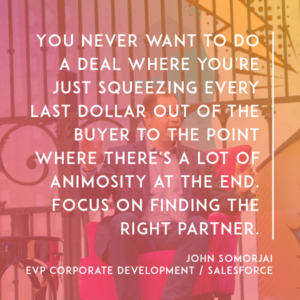
That doesn’t help anyone because this is a very small industry. You’re going to run into people that you’re dealing with in later careers. You never want to try to do a deal where you’re just doing everything to squeeze every last dollar out of the buyer to the point where there’s just a lot of animosity that happens in the end.
I just think you need to find the right partner. If you need to hire a banker, hire one that is not going to squeeze out that last dollar and focus on price. That actually at the end of the day is not a good deal for anyone.
Because what happens is you end up in the company, you got rich in the process, you feel like you got this incredible price, but guess what? That company is going to expect a heck of a lot of you. You’re going to have to deliver on the financial model that the corporate development team put together to justify that really high price.
If you can’t deliver on that model, you may not last with the company, but also the deal itself is going to be viewed as a failure internally. You’ve just created a huge PR nightmare for yourself. It just does no one any good.
Mark: In the “life is very short category”, in case you didn’t know, in 2007, my second company was acquired by Salesforce.com. My buyer was John Somorjai. It’s been great having a working relationship with you for the last decade.
John: How did we treat you and your team in the process?
Mark: I think treated my very well. My biggest regret is Mark kept telling me…Company was fairly small in ’07, and he’s like, “We’re going to be this big, and it’s going to have this growth.”
I just didn’t believe it. I thought, “Ah, maybe I’ll try my hand at it as a VC.” If I did the math, I probably wasn’t that smart for not staying longer. You guys have performed incredibly.
John: What’s cool about that…
Mark: By the way, I just want to say real quickly I think, of my team except for me, the minimum a person stayed at the company was five years.
By the way, my team didn’t want to sell to Salesforce, not anything against Salesforce, but they didn’t actually want to work at what they perceived as a big company. They wanted to stay independent. What I said to them is, “You guys have never worked at a company that has scale.”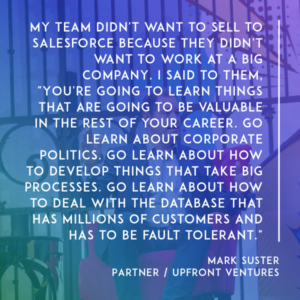
I had. I said, “You’re going to learn things that are going to be valuable in the rest of your career when you go back to being start ups. Go learn about corporate politics. Go learn about how to develop things that take big processes. Go learn about how to deal with the database that has millions of customers and has to be fault tolerant. Those skills will be incredibly valuable to you.”
They enjoyed the process. I think several of them are still there.
John: Half of the engineering team is still with us, just had their 10th year anniversary.
Mark: That’s unbelievable, and they all made a lot of money which pisses me off because I should have stayed. No, of course I’m delighted.
[laughter]
Mark: I’m delighted for them, not for me.
I would say also, John, in the life is short category, eventually two of them left, Tim Barker who’s now CEO of a SaaS company based in Europe. He got that opportunity from first having joined Salesforce and then he ran marketing for Europe, you remember for you guys, and developed that skill set that allowed him to become a chief product officer and then a CEO.
Ryan Lissack, who’s had a tremendous run, he saw scale at Salesforce and did well at Salesforce, became the CTO of Maker Studios which we sold for for $700 million. He did very well. Thank you very much. Good for him. Again, he did better than I did.
[laughter]
Mark: No one ever told me this VC thing. When you’re an entrepreneur, you get paid right away. I got to return the entire fund before I get any upside. Why didn’t you tell me?
[laughter]
John: I think I tried.
Mark: You did, yeah. Tell me this, John. Every company works a little bit differently.
In some companies, corporate development, I’ve noticed is legal or IT. It’s where deals go to die. You get an overexcited product guy or salesperson or saleswoman, marketing person, and they take it to corp dev. They’re like, “No, that deal’s never going to fly. You’re paying too much. We can buy something cheaper.”
In some places, corporate development has a lot of power and actually is the place that drives deals. How do I know? How do I know when to talk to corp dev versus business and how the power structure works and how decisions get made?
John: I think you always want to start off talking to the business. That’s the best place to go because I take my cues of what companies we’re going to buy and also what we’re going to invest in based on the reactions from our product teams or from our sales teams.
We get their input before we really engage on a deal because every deal has to have an executive sponsor whether we’re investing or we’re buying. You want to start at the business level. You want to build those relationships, prove it out with customer case studies, then go to corp dev.
You can always ask for introductions to corp dev from the person you’re dealing with at the company which is always better because we’re all inundated with companies approaching us all the time. We pay attention more to what our executive team is sending to us and our product team is sending to us. It’s always better.
Mark: I may try to wrap a bow around this, John, by saying, as someone who’s been acquired by Salesforce.com, you guys were a great acquirer. My team was treated incredibly fairly. They got great roles and earned and, as we’ve already said, stayed for a long time.
As a venture capitalist now, I would work with Salesforce on any deal. I hugely appreciate both that you guys are not just helpful but we don’t get some of the corporate bullshit that I do on some other deals, which I try very hard not to do.
Finally, I just want to say thank you to Marc Benioff, to your leadership team, to you for living the social values that many people in our industry care about and taking a stand because that’s incredibly important to hold our politician’s feet to the fire. Thank you for that too.
John: Yeah, thank you.
[applause]
John: It’s great to be here.
Mark: That’s it?
John: Yeah, bye bye.
Mark: Thank you.

